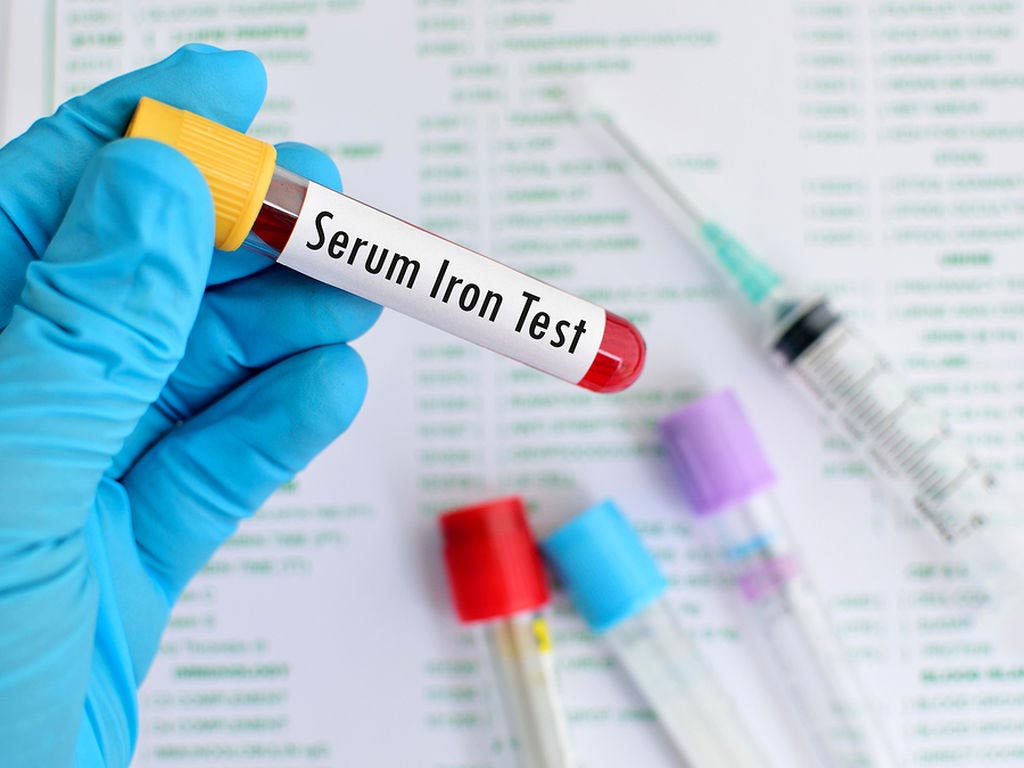Higher Iron Levels Increase Thromboembolism Risk
|
By HospiMedica International staff writers Posted on 31 Jul 2019 |

Image: A new study claims iron levels can influence VTE and infection risk (Photo courtesy of 123rf).
A new study reveals that although naturally higher blood serum iron levels reduce atherosclerosis, they also increase the risk of venous thromboembolism (VTE), stroke, and bacterial skin infection.
Researchers at Imperial College London (Imperial; United Kingdom), Bordeaux population health (France), the University of Ioannina (Greece), and other institutions conducted a study to investigate the effect of genetically determined iron status on carotid intima‐media thickness, carotid plaque, and VTE using a genome‐wide Mendelian randomization of relevant data from 48,972 subjects. Two‐sample summary data Mendelian randomization was performed for analysis.
The results revealed that higher genetically determined iron status was associated with increased risk of VTE and a higher risk of bacterial skin infection, with odds ratios per standard deviation (SD) increase in biomarker levels of 1.37 for serum iron, 1.25 for transferrin saturation, 1.92 for ferritin, and 0.76 for serum transferrin (with higher transferrin levels representing lower iron status). In contrast, higher iron status was also associated with lower risk of carotid plaque. The study was published on August 6, 2019, in the Journal of the American Heart Association.
“Iron is a crucial mineral in the body, and is essential for carrying oxygen around the body. However, getting the right amount of iron in the body is a fine balance; too little can lead to anemia, but too much can lead to a range of problems, including liver damage,” said lead author Dipender Gill, MD, PhD, of ICL. “The study only looked at naturally occurring iron levels in the body related to genetic variation between individuals, and did not investigate the effect of taking iron supplements.”
Mendelian randomization examines measured variation in genes of known function to study the causal effect of a modifiable exposure on disease in epidemiological studies of common genetic polymorphisms with well-understood effects on exposure patterns. The genotype must only affect the disease status indirectly via its effect on the exposure of interest. Mendelian randomization was first described as a method for obtaining unbiased estimates of the effects of a putative causal variable, without conducting a traditional randomized trial.
Related Links:
Imperial College London
Bordeaux population health
University of Ioannina
Researchers at Imperial College London (Imperial; United Kingdom), Bordeaux population health (France), the University of Ioannina (Greece), and other institutions conducted a study to investigate the effect of genetically determined iron status on carotid intima‐media thickness, carotid plaque, and VTE using a genome‐wide Mendelian randomization of relevant data from 48,972 subjects. Two‐sample summary data Mendelian randomization was performed for analysis.
The results revealed that higher genetically determined iron status was associated with increased risk of VTE and a higher risk of bacterial skin infection, with odds ratios per standard deviation (SD) increase in biomarker levels of 1.37 for serum iron, 1.25 for transferrin saturation, 1.92 for ferritin, and 0.76 for serum transferrin (with higher transferrin levels representing lower iron status). In contrast, higher iron status was also associated with lower risk of carotid plaque. The study was published on August 6, 2019, in the Journal of the American Heart Association.
“Iron is a crucial mineral in the body, and is essential for carrying oxygen around the body. However, getting the right amount of iron in the body is a fine balance; too little can lead to anemia, but too much can lead to a range of problems, including liver damage,” said lead author Dipender Gill, MD, PhD, of ICL. “The study only looked at naturally occurring iron levels in the body related to genetic variation between individuals, and did not investigate the effect of taking iron supplements.”
Mendelian randomization examines measured variation in genes of known function to study the causal effect of a modifiable exposure on disease in epidemiological studies of common genetic polymorphisms with well-understood effects on exposure patterns. The genotype must only affect the disease status indirectly via its effect on the exposure of interest. Mendelian randomization was first described as a method for obtaining unbiased estimates of the effects of a putative causal variable, without conducting a traditional randomized trial.
Related Links:
Imperial College London
Bordeaux population health
University of Ioannina
Latest Critical Care News
- CPR Guidelines Updated for Pediatric and Neonatal Emergency Care and Resuscitation
- Ingestible Capsule Monitors Intestinal Inflammation
- Wireless Implantable Sensor Enables Continuous Endoleak Monitoring
- Pulse Oximeter Index Offers Non-Invasive Guides for Fluid Therapy
- Wearable Patch for Early Skin Cancer Detection to Reduce Unnecessary Biopsies
- 'Universal' Kidney to Match Any Blood Type
- Light-Based Technology to Measure Brain Blood Flow Could Diagnose Stroke and TBI
- AI Heart Attack Risk Assessment Tool Outperforms Existing Methods
- Smartphone Imaging System Enables Early Oral Cancer Detection
- Swallowable Pill-Sized Bioprinter Treats GI Tract Injuries

- Personalized Brain “Pacemakers” Could Help Patients with Hard-To-Treat Epilepsy
- Microscopic DNA Flower Robots to Enable Precision Medicine Delivery
- Origami Robots to Deliver Medicine Less Invasively and More Effectively
- Improved Cough-Detection Technology Aids Health Monitoring
- AI Identifies Children in ER Likely to Develop Sepsis Within 48 Hours
- New Radiofrequency Therapy Slows Glioblastoma Growth
Channels
Surgical Techniques
view channel
Robotic Assistant Delivers Ultra-Precision Injections with Rapid Setup Times
Age-related macular degeneration (AMD) is a leading cause of blindness worldwide, affecting nearly 200 million people, a figure expected to rise to 280 million by 2040. Current treatment involves doctors... Read more
Minimally Invasive Endoscopic Surgery Improves Severe Stroke Outcomes
Intracerebral hemorrhage, a type of stroke caused by bleeding deep within the brain, remains one of the most challenging neurological emergencies to treat. Accounting for about 15% of all strokes, it carries... Read morePatient Care
view channel
Revolutionary Automatic IV-Line Flushing Device to Enhance Infusion Care
More than 80% of in-hospital patients receive intravenous (IV) therapy. Every dose of IV medicine delivered in a small volume (<250 mL) infusion bag should be followed by subsequent flushing to ensure... Read more
VR Training Tool Combats Contamination of Portable Medical Equipment
Healthcare-associated infections (HAIs) impact one in every 31 patients, cause nearly 100,000 deaths each year, and cost USD 28.4 billion in direct medical expenses. Notably, up to 75% of these infections... Read more
Portable Biosensor Platform to Reduce Hospital-Acquired Infections
Approximately 4 million patients in the European Union acquire healthcare-associated infections (HAIs) or nosocomial infections each year, with around 37,000 deaths directly resulting from these infections,... Read moreFirst-Of-Its-Kind Portable Germicidal Light Technology Disinfects High-Touch Clinical Surfaces in Seconds
Reducing healthcare-acquired infections (HAIs) remains a pressing issue within global healthcare systems. In the United States alone, 1.7 million patients contract HAIs annually, leading to approximately... Read moreHealth IT
view channel
Printable Molecule-Selective Nanoparticles Enable Mass Production of Wearable Biosensors
The future of medicine is likely to focus on the personalization of healthcare—understanding exactly what an individual requires and delivering the appropriate combination of nutrients, metabolites, and... Read moreBusiness
view channel
Philips and Masimo Partner to Advance Patient Monitoring Measurement Technologies
Royal Philips (Amsterdam, Netherlands) and Masimo (Irvine, California, USA) have renewed their multi-year strategic collaboration, combining Philips’ expertise in patient monitoring with Masimo’s noninvasive... Read more
B. Braun Acquires Digital Microsurgery Company True Digital Surgery
The high-end microsurgery market in neurosurgery, spine, and ENT is undergoing a significant transformation. Traditional analog microscopes are giving way to digital exoscopes, which provide improved visualization,... Read more
CMEF 2025 to Promote Holistic and High-Quality Development of Medical and Health Industry
The 92nd China International Medical Equipment Fair (CMEF 2025) Autumn Exhibition is scheduled to be held from September 26 to 29 at the China Import and Export Fair Complex (Canton Fair Complex) in Guangzhou.... Read more














